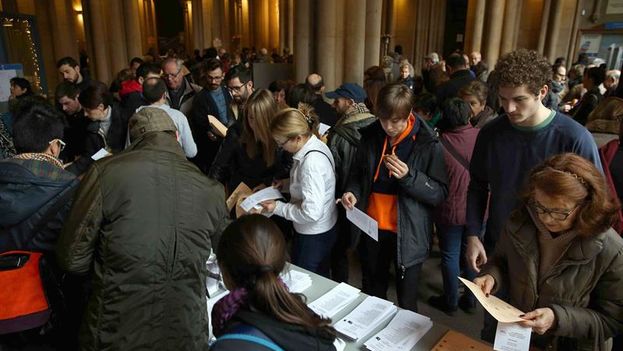
![]() 14ymedio, Manuel Cuesta Morua, Havana, 28 December 2015 — The general elections held in Spain this 20 December (20-D) contain a number of important lessons for Cuba and for Cubans, as we look ahead to the electoral process in 2018. Here is a reflection on these lessons, at a distance of space and time.
14ymedio, Manuel Cuesta Morua, Havana, 28 December 2015 — The general elections held in Spain this 20 December (20-D) contain a number of important lessons for Cuba and for Cubans, as we look ahead to the electoral process in 2018. Here is a reflection on these lessons, at a distance of space and time.
I participated in 20-D as a kind of international observer in the role of representative of the initiative #Otro18*. In the Principality of Asturias, where I was invited – and which I would like to thank, not only for the beauty in miniature of a city like Oveido, but also because the workings of the political systems can be better observed far from the major metropolitan cities – I observed on my arrival the calm bustle in which all the competing political groups prepared, in various ways, for the important exercise of choosing among the diversity of parties and between the four major faces: Mariano Rajoy (Popular Party, PP, in power since 2011), Pedro Sanchez (Spanish Socialist Workers Party, PSOE), Pablo Iglesias (Podemos, (We Can)) and Albert Rivera (Ciudadanos, (Citizens)).
Upon my arrival I was quickly driven to the House of the People in Oviedo: an exquisite and well-preserved example of the architecture of the 18th century which once served as a home for Catholic nuns and now is home to the PSOE. Being held there, and this is the first lesson for us, was the most fortunate of those typically boring meetings we humans commonly hold. It was the usual meeting, prior to the election cycle, of the different political groups among what they call auditors and guardians: a troop of party members who, on election day, monitor the transparency and fairness of the process.
The meeting included: a rereading the manual updated for the elections; a recounting of the incidents and problems associated with previous elections (the municipal elections held in May throughout Spain); a reminder, in the case of old auditors and guardians, and guidance in the case of new ones, of their duties and rights on the election day; a discussion in detail of what constitutes, according to the code, an electoral offense; and the locations of the local polling stations, among the total of 23,000 to be opened in throughout Spain. All of this was part of the necessarily boring night meeting in one of the PSOE headquarters. I learned there that this also was taking place among the other political parties.
This boredom of this process is a fortunate thing for a political exercise as important and complicated as elections. We should grasp the need for it because it is the only way to tackle one of the key axes of democratic systems: the nervousness that spreads among the political class faced with the uncertainties of citizens’ votes.
The second lesson is that, when it comes to elections in pluralistic system, we must be prepared for surprises. It is not always what you expect, whether it is the trends that mark traditions, or the currents expressed in opinion polls, that do or do not coincide with what happens in reality. In the 20-D elections there were several surprises: a clear end of bipartisanship — that is the dominance of two major parties; the emergence of new parties in Congress (Podemos and Ciudadanos); the dissolution of the arrogant majorities; and a return to the culture of dialogue and agreement needed to advance public policies.
The third lesson is that democracies cannot be hegemonic and respect the rights of minorities. One complaint I hear constantly is that majoritarian systems unleash the temptation to ignore the needs and interests of the minority, to manipulate the mass of voters and to turn the opposition into a noisy species unable to reverse pernicious decisions legitimated by the weight of the majority. Ultimately, and this is a modern element relevant to at least all Western countries, globalized societies are highly fragmented by a multitude of minorities – religious, political, ideological, ethnic or cultural – so that democracies should encourage coalitions that take into account the interests of all. For Cuba this lesson is urgent.
However, the most important lesson for us Cubans is the tolerance and respect for diversity displayed in a society like Spain’s, despite the bitter tone of political debate.
*Translator’s note: #Otro18 refers to the citizen’s initiative “AlternativaCuba2018”, which anticipates multiparty democratic elections in Cuba in 2018, the year in which Raul Castro has announced he will step down as president.
